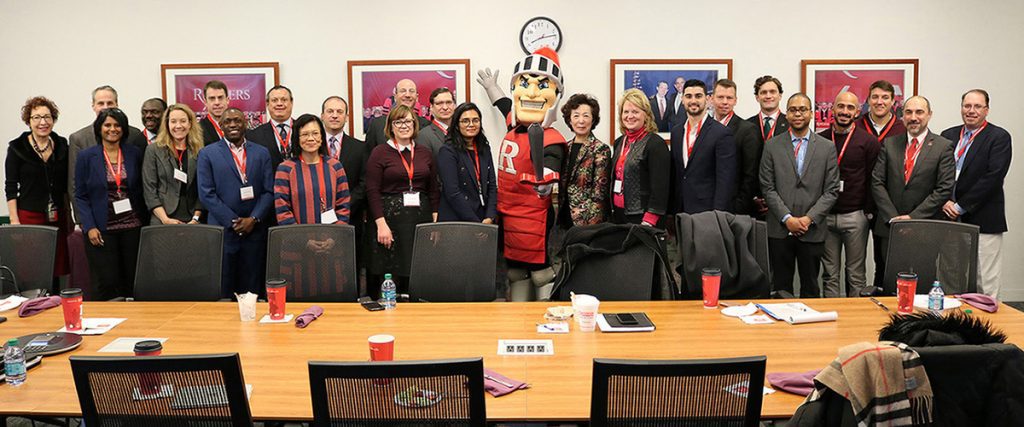4 MBA Trends to Look Out For In 2019

Recently, we discussed about most important numbers of the previous year. MBA application rates were declining, average salaries are on the upswing, gender equity took major steps, technology and products/services jobs are jumping, and GMAT scores continue to rise. But what does all this mean for 2019?
Are there any MBA trends to look out for in 2019 and what can you expect? Continue reading…
Are Companies Getting Big Data Wrong? – New York News

Let’s explore some of the most interesting stories that have emerged from New York business schools this week.
Columbia Business School Researchers Argue Future of Big Data Lies in Its Ability to Assess Consumers’ Mindset in Real Time – Columbia Business School News
Columbia Business School professors Sandra Matz and Oded Netzer recently published a new discussion paper in the Current Opinion in Behavioral Sciences in which they “address the challenges and opportunities of using big data to benefit both business and consumers based on psychological profiles drawn from information posted on personal websites and discussion forums, and language used on Facebook and Twitter.”
Netzer writes, “Big data usage is quickly evolving. With technological advances in the collection, storage and analysis of large amounts of data, businesses can now gain valid insights on millions of consumers as they go about their daily lives.”
Matz adds, “One benefit of psychological profiling is that the pre-selection of ads based on psychological needs can alleviate the problem of choice overload. It can even help target highly neurotic individuals who display early signs of depression with ads that guide them to self-help pages or offer professional advice.”
You can read the full article here.
When Students Come First – BizEd
According to the National Center for Education Statistics, upwards of 30 percent of freshman in higher-education in the United States are the first members of their family to do so. However, there is also a direct correlation to dropout rates: first-gen students have a dropout rate that is four times that of non-first generation students. The research also found that only 11 percent of the first-gen students manage to secure a Bachelor’s degree within six years.
The statistics find that the reason for the dropout rates has less to do with personal decisions, and more with the “lack the financial, social, and emotional support they need to navigate college successfully,” says BizEd writer Tricia Bisoux. Several schools, including the Rutgers Business School in Newark and New Brunswick, have altered the way they approach its first generation students.
“At Rutgers Business School (RBS) at Rutgers University in New Jersey, the key to supporting first-generation students is a suite of programs called RBS-PLUS (Pathways Leading to Undergraduate Success), launched in 2013. Delivered through the business school’s office of diversity, RBS-PLUS doesn’t just support its current first-generation and low-income undergraduates. It also reaches out to high school students to offer guidance just as they’re beginning their college preparation.”
You can find out more about the program here.
Facebook Is an ‘Extraordinary Failure in Leadership,’ NYU’s Galloway Says – Bloomberg
NYU Stern Marketing Professor Scott Galloway recently stopped by the Bloomberg television studios to talk about the ever-tumultuous Facebook galaxy, dishing out some heavy criticism of Mark Zuckerberg and the tech-giant company as a whole. Watch his interview with the Bloomberg panel here.
Georgetown Launches New MBA Certificate in Consumer Analytics and Insights

In response to overwhelming demand by students and recruiters, Georgetown University’s McDonough School of Business launched a new MBA Certificate in Consumer Analytics and Insights. The certificate delves deep into marketing data and analytics to provide MBA students with the necessary skills needed to drill down into consumer behavior and marketing practice through data. Continue reading…
New York News: How Climate Change is Effecting Your Mood, and More

Let’s explore some of the most interesting stories that have emerged from New York City business schools this week.
Climate Change Could Explain the Personality of Your Significant Other – CBS Newsroom
New research from Columbia Business School professor Adam Galinsky, along with Ph.D. candidate Jackson Lu has found a curious connection between the climates to which we grew accustomed as youngsters and our dispositions.
“Ambient temperature can shape the fundamental dimensions of personality. Our research reveals a connection between the ambient temperature that individuals were exposed to when they were young and their personality today. This finding can help explain the personality differences we observe in people of different regions.”
To further study to potential climate differences, the paper’s authors conducted research in two of the world’s most densely populated and geographically large countries: the United States and China. Lu explains the results:
“Clement [mild] temperatures encourage individuals to explore the outside environment, where social interactions and new experiences abound. Venturing outdoors and interacting with lots of people make people more agreeable, conscientious, emotionally stable, extraverted, and open to new experiences. But when the temperature is too hot or too cold, individuals are less likely to go outside to meet up with friends or to try new activities.”
Read more about the duo’s research here.
Launching a New Alumni Initiative – Rutgers Business School
The Rutgers Business School recently launched a new Corporate Alumni Advisory Council to strengthen the engagement between its current students and RBS alumni at marquee companies like PwC, Johnson & Johnson, and Wells Fargo.

Several members of the brand new Rutgers Business School Corporate Alumni Advisory Council / Photo via RBS
“This is a very exciting initiative with huge potential for networking, lifelong learning and connecting on so many levels that can benefit our alumni, their companies and Rutgers Business School,” said Andrea Cunnell, director of alumni and corporate engagement at Rutgers Business School.
Read more about the initiative here.
Campus Recruiting Hurts Older Workers, Suit Against PricewaterhouseCoopers Claims – Wall Street Journal
In an interview with Kelsey Gee of the Wall Street Journal, NYU Stern School of Business assistant professor Michael North says that as more and more Americans over the age of 65 delay their retirement, certain corporate biases are hurting them. The result of the bias has become the basis of a lawsuit against PricewaterhouseCoopers.
Gee explains:
Attorneys for the unsuccessful candidates—men who applied to PwC dozens of times in their late 40s and early 50s—aimed to convince San Francisco District Judge Jon Tigar on Tuesday that 14,000 older workers were similarly disadvantaged by the accounting firm’s system of finding applicants at university career fairs and school-affiliated job websites, over a four-year period.
You can read more about the lawsuit here.
For the Most Complex Technology Problems, Stevens Research Turns to Nature – Stevens Institute of Technology
Data science expert Dr. Amir H Gandomi, at the Stevens Institute of Technology School of Business, has used techniques from evolutionary computation to gain insight into large-scale optimization and data-mining problems, as well as supply chain management and customer engagement and interaction.
“When you have mathematical solutions to your problems, that’s great, but real-world problems are more complex — they’re nonlinear, mixed variables, large scale, sometimes black box. In these cases, these kinds of algorithms are flexible and adaptable enough to help you find answers.”
Read more about about Dr. Gandomi’s innovative research here.
Tech’s Greatest Age of Innovation Happened Already, According to New Stanford Research

As each individual technological revolution changes the pace of advancement, new data from the Stanford Graduate School of Business reveals the a small handful of years changed our technological trajectory more than any time in human history.
Berkeley Haas Fellow Talks Myopia in the Face of Information Overload

In an era of information overload, habits can turn primal, according to Berkeley Haas School of Business teaching fellow Maura O’Neill.
O’Neill, who is also the Faculty Director of UC Berkeley’s Executive Leadership Program, and the former Chief Innovation Officer of the U.S. Agency for International Development under President Obama, says that the “cognitive myopia” or narrow-mindedness that results from the sheer bombardment of sensory data flying at us every moment forces us to “rely heavily on our long-term memory to make decisions.”
O’Neill believes that these types of shortcuts—natural responses to over-stimulation—are where errors in judgment begin and “[sometimes] these decision-making errors can lead to catastrophic results,” she writes.
According to the article, “By blocking information that doesn’t fit with what we already know, or think we want to know, our brains enable us to make decisions quickly and efficiently. But often, we overlook key data deliberately or unconsciously.”
O’Neill cites governmental failures like pre-9/11 terrorist warnings the 2008 financial crisis, as well as industrial failures like the “taxi industry’s failure to recognize how smartphones could revolutionize ride-hailing services,” as well as “Uber’s belief that its treatment of workers and regulators would not impact its business reputation and growth.”
Many researchers and pundits are quick to point to big data to save the day but analytics have the potential to exacerbate narrow-mindedness if “statistics used to predict future events are based on past patterns.”
She points to an example where the state of Michigan discovered fraudulent claims for state unemployment insurance from a faulty big data algorithm and wrongfully terminated 20,000 human claims reps.
O’Neill writes, “If we don’t get the algorithms right, we’re setting ourselves up for failure.” Data notwithstanding, O’Neill says we need to take collective steps to reflect on our own unconscious biases.
O’Neill concludes, “Until everyone recognizes that we are all narrow-minded, we are not going to overcome it. And the remedies to the most pressing business problems or in government or in our own personal lives are going to require new innovative solutions.”
